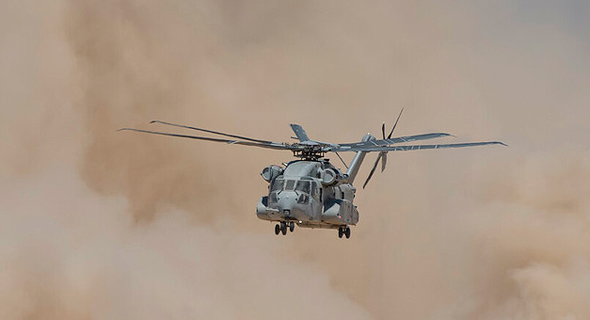Are Israel's new $100 million helicopters allergic to dust?
The Ministry of Defense is planning to acquire 20 CH-53K King Stallion heavy-lift helicopters at a cost of $2.1 billion but a recent report has revealed that they suffer from degrading engine performance in sandy and dusty conditions
A week after Israel's Minister of Defense Benny Gantz approved the Air Force's recommendation to purchase from the U.S. the new CH-53K King Stallion heavy-lift helicopter at $100 million per chopper, it has been revealed that the helicopter suffers from degrading engine performance in sandy and dusty environments, which are very common in the Middle East.
The issues came to light in the most recent annual Director Operational Test and Evaluation (DOT&E) report, and the U.S. Navy confirmed to website The War Zone, which was the first to highlight the report, that these problems are ongoing.
As a result, the U.S. Marine Corps is currently significantly limiting the amount of time the helicopter can spend flying in sandy and dusty environments, also known as brownout conditions, to address concerns about degrading engine performance after 21 minutes of exposure to these conditions.
 The new CH-53K King Stallion heavy-lift helicopter. Photo: Lockheed Martin
The new CH-53K King Stallion heavy-lift helicopter. Photo: Lockheed Martin
“The Developmental Test report published on September 10, 2020, indicates engine performance degrades below acceptable minimums after
21 minutes of exposure to brownout conditions,” read DOT&E’s report, published in January. “The aircraft’s operating manual limits permissible engine exposure to brownout during a maneuver to 70 seconds.”
“Engine performance degradation in brownout conditions will necessitate extremely frequent engine replacements and repair if the Marine Corps continues to train and operate in locations where brownout conditions are prevalent,” the report continued. “CH-53K aircrew cannot realistically perform external cargo delivery operations within the 70-second operating limit.”
In addition, the helicopter will be expected to transport Israeli military forces in enemy territory, both onloading and offloading them, a mission that can not be practically completed within 70 seconds.
The new helicopter, which is manufactured by Sikorsky, a Lockheed Martin company, was selected by the Israeli Air Force (IAF) even though it is significantly more expensive than its competition Boeing's CH47F helicopter, partially due to the fact that Lockheed Martin presented data that showed its maintenance costs would be cheaper. However, those calculations will change should it be determined that the lifespan of the engines is shorter than expected or that there is a need to develop specific filters for them.
The Ministry of Defense is planning to acquire 20 of these helicopters at a cost of $2.1 billion. The ministry is currently in talks with Lockheed and the U.S. Department of Defense in order to try and bring forward the delivery of the helicopters in an effort to rapidly replace its aging Sikorsky's (called "Yasour" by the IAF) that are set to be retired in 2025.
Lockheed Martin, the parent company of the Sikorsky division responsible for the CH-53K, provided The War Zone with the following statement:
"Sikorsky and our customer continue to operate an integrated test plan and are committed to enter Initial Operational Test & Evaluation as planned in June, support operational deployment and expand production of this all-new heavy-lift helicopter.
"The team is already addressing technical issues cited in the report, a majority of which have been resolved, and are confident we have solutions to address the few outstanding issues to enter into IOT&E as scheduled this year.
“We understand the sand ingestion issue and, as the aircraft integrator, have assigned a dedicated team of our most experienced engineers to work alongside NAVAIR and General Electric to resolve this issue.”



